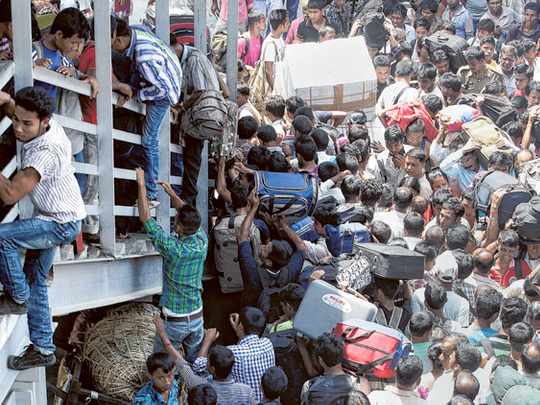
Guwahati: Illegal migration from Bangladesh has been the dominant theme of Assam politics since independence. However, over the years, successive federal governments or state governments have done little to curb this.
Immigration from Bangladesh or erstwhile East Pakistan has a colonial history. People were brought in as a British policy into Assam to further the British policy of ‘grow more food’. But after independence and mostly after the creation of Bangladesh in 1971, the reasons for this illegal influx are purely economical.
“The reason why so many have crossed over from Bangladesh to India boils down to simple economics,” says Prof Syed Munir Khasru, Chairman of the Institute of Policy, Advocacy and Governance in Bangladesh. “Bangladesh has a population density of 1,150 per sq km and a per capita income of Rs46,870 (Dh3,112.94), whereas Assam with a population of 397 per sq km and a per capita income of Rs84,400 is a greener pasture.”
“According to the Census of India 2001, two million people have migrated to Assam since 1951,” says Walter Fernandes, Director of the Guwahati-based North Eastern Social Research Centre. “Considering the immigrants’ natural population growth, the number of migrants rises to 4 million.”
“Illegal migration has been a reality that both the Centre and the state have shied away from. The state’s ruling Congress party might have nurtured an imported vote bank. Other parties, while in power, also did precious little to rectify it. When the Asom Gana Parishad (AGP) was in power in the 1990s, it took no serious steps against illegal immigration,” says Samujjal Bhattacharyya, adviser of the All Assam Students Union (AASU), which first gave the call “Assam for Assamese”. He feels the need of the hour is to implement the Assam Accord of 1985 in totality and wants the demographic profiling of Assam to be done by updating the National Register of Citizen (NRC) of 1951.
Porous border
The large unmanned border between Assam and Bangladesh is the primary reason for this easy influx across the border, which is difficult to manage, said a senior official of the Border Security Force on condition of anonymity.
Security forces also lament that the administration also eagerly helps the illegal migrant to become Indian. According to the officials, the migrants come across from the river border, first live on the sandbars on the Brahmaputra till they establish contact with the already-established community. They pay Rs 1,000 for a character certificate of sorts procured from the village headman, which states they belong to that particular village and that makes them “Assamese”. With one foot in the door, they use the letter to then transform from an “Assamese” to a full-fledged Indian citizen all through forged documents like ration card, voter ID, school certificate and passports.
“Even if you determine who is a foreigner, where do you deport him to?” questions Assam Chief Minister Tarun Gogoi. “Who is going to take them, where do we send him? It will raise a number of humanitarian issues. We need to seal the border, and then put our heads together towards finding a solution to this problem,” he added.
Union Home Ministry officials agree that illegal immigration is a serious issue that now not only affects Assam but also other states like West Bengal, Maharashtra and Delhi, where people from outside are putting enormous pressure on the resources and creating a situation of internal conflict.
“But problems like this cannot be settled over time as it also means substantial development in Bangladesh to keep these people from pouring in,” said an official.
“We agree that these are difficult issues, but there should be a consolidated effort on the part of the government to solve the problem or else situations like this will be repeated frequently and too many innocent lives will be lost,” said Sunila Chetri who runs an NGO.












